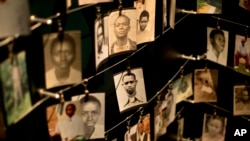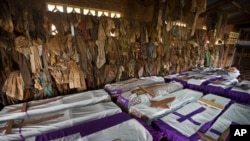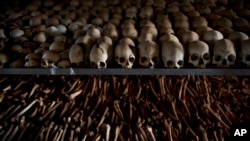At the end of this month, the International Criminal Tribunal for Rwanda (ICTR) will be closing its doors. The United Nations Security Council established the court in 1994 after the genocide in which Hutu militants killed some 800,000 Tutsis and politically moderate Hutu.
Twenty years later, the ICTR has indicted 93 people, convicted 61 and acquitted 14.
Observers say the tribunal’s mission – to apprehend and prosecute those behind the Rwandan genocide – represented a historic change in thinking and in international law.
Geraldine Mattioli-Zeltner, the international justice advocacy director of Human Rights Watch, said for most of history, genocide, mass killings and what today are called crimes against humanity went unpunished.
The term genocide didn't even exist until it was coined to describe the Nazi slaughter of Jews during World War Two.
“It represents a cultural shift,” Mattioli-Zeltner said. “Until that time in the 1990s, a lot of crimes were committed and those responsible were always able to escape punishment. With the creation of the tribunal, there’s a strong signal that atrocities won't be tolerated.”
Wide influence
The Rwanda tribunal paved the way for the establishment of the International Criminal Court (ICC) in The Hague.
It also led to changes in international jurisprudence. It was one of the first courts to prosecute rape as a crime of genocide. And it led to the increased use of "universal jurisprudence" for trying crimes against humanity. Rwandans indicted for genocide-related crimes have been tried in Belgium, Britain, France, the Netherlands and Norway.
Some suspects have been handed over to Rwandan courts – but only after the government agreed to abolish the death penalty and introduce other legal reforms to address concerns about credible and fair trials.
Among them was the creation of a mechanism within the Rwandan justice system to improve the protection of witnesses. Human Rights Watch says some of the cases tried in Rwanda have been handled fairly, though Mattioli-Zeltner said others suffered from political interference.
Criticism
The International Criminal Tribunal for Rwanda is not beloved by all. Critics say it tried a relatively small number of perpetrators and conducted the trials in Arusha, Tanzania - away from the families of the genocide victims.
Critics also say the process was too long and too expensive – one of the reasons the tribunal is being closed.
Human Rights Watch said it’s dissatisfied that the court did not bring to trial members of the invading group that ended the genocide, the mostly Tutsi-led Rwandan Patriotic Front (RPF).
Mattioli-Zeltner said the court was mandated to look into allegations that the RPF committed war crimes and crimes against humanity against ethnic Hutu, some of whom the RPF considered to be supporters of the genocidal government the RPF overthrew.
“The Rwandan government,” she said, “made clear it would stop cooperating in all the other genocide cases if the tribunal was prosecuting these kinds of cases. So, it does look like the tribunal gave priority to securing further cooperation by the Rwandan government in existing cases rather than prosecuting the RPF cases.”
Some still at large
Eight of the 93 people indicted by the tribunal are still at large. Mattioli-Zeltner said if they are found, five will be referred to the Rwandan justice system.
But three – including a former defense minister – will be tried by the so-called “residual mechanism.”
It’s a remnant of the International Criminal Tribunal for Rwanda and another court that is also closing – the International Criminal Tribunal for the former Yugoslavia. It will handle a number of remaining issues, including appeals, retrials, review proceedings and assist local jurisdictions.
The mechanism is a small tribunal with few staff with a mandate to deal with the leftover business of the two tribunals.
“The residual mechanism,” explained Mattioli-Zeltner, “is in charge of continuing the search for those who are [still at large] and dealing with any decisions that are needed in the future. You have some convicts serving prison sentences at this time, so it may be needed for proceedings to see if they can be freed earlier; there are witnesses who are protected and whose situation needs to be monitored.”
The eventual arrest of those who are still evading capture would mean a successful end to the tribunal’s efforts. Human Rights Watch urges states to maintain their resolve in bringing the eight fugitives to justice.











